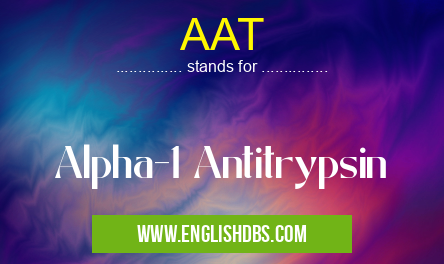What does AAT mean in LABORATORY
Alpha-1 Antitrypsin is a protein produced by the liver that protects the lungs from damage caused by enzymes called proteases.

AAT meaning in Laboratory in Medical
AAT mostly used in an acronym Laboratory in Category Medical that means Alpha-1 Antitrypsin
Shorthand: AAT,
Full Form: Alpha-1 Antitrypsin
For more information of "Alpha-1 Antitrypsin", see the section below.
» Medical » Laboratory
- AAT stands for Alpha-1 Antitrypsin, a protein produced by the liver.
- AAT plays a crucial role in protecting the lungs and reducing inflammation.
Function of AAT
- Inhibits enzymes: AAT inhibits the action of enzymes called proteases, which can damage lung tissue.
- Protects against inflammation: AAT reduces inflammation in the lungs by neutralizing free radicals and other inflammatory mediators.
- Antioxidant: AAT has antioxidant properties, helping to protect cells from oxidative damage.
AAT Deficiency
- Genetic disorder: AAT deficiency is caused by a genetic mutation that affects the production of AAT.
- Lung disease: AAT deficiency can lead to emphysema, a lung disease that damages air sacs and makes breathing difficult.
- Liver disease: AAT deficiency can also cause cirrhosis, a scarring of the liver.
Diagnosis and Treatment
- Blood test: AAT levels can be measured through a blood test.
- Genetic testing: Genetic testing can confirm an AAT deficiency diagnosis.
- Augmentation therapy: Treatment for AAT deficiency involves administering purified AAT intravenously to increase levels in the body.
Essential Questions and Answers on Alpha-1 Antitrypsin in "MEDICAL»LABORATORY"
What is Alpha-1 Antitrypsin (AAT)?
What is the function of AAT?
AAT acts as a shield against proteases, which are destructive enzymes that can break down lung tissue. It neutralizes these proteases, preventing them from causing damage.
What causes AAT deficiency?
AAT deficiency is typically caused by a genetic mutation that results in the production of either too little or non-functional AAT.
How does AAT deficiency affect the lungs?
In AAT deficiency, the lack of sufficient AAT allows proteases to damage the lung tissue. This can lead to chronic obstructive pulmonary disease (COPD), emphysema, and other respiratory problems.
What are the symptoms of AAT deficiency?
Symptoms of AAT deficiency can include:
- Shortness of breath
- Wheezing
- Coughing
- Chest pain
- Chronic bronchitis
- Repeated lung infections
How is AAT deficiency diagnosed?
AAT deficiency is diagnosed through a blood test that measures the level of AAT in the blood.
What are the treatments for AAT deficiency?
Treatments for AAT deficiency include:
- Augmentation therapy: Regular infusions of AAT to supplement the body's low levels
- Medications to manage COPD and other respiratory symptoms
- Pulmonary rehabilitation to improve lung function
- Smoking cessation and avoidance of secondhand smoke
Final Words: AAT is a vital protein that protects the lungs and reduces inflammation. AAT deficiency can lead to serious health conditions, but early diagnosis and treatment can help manage these risks.
AAT also stands for: |
|
| All stands for AAT |
